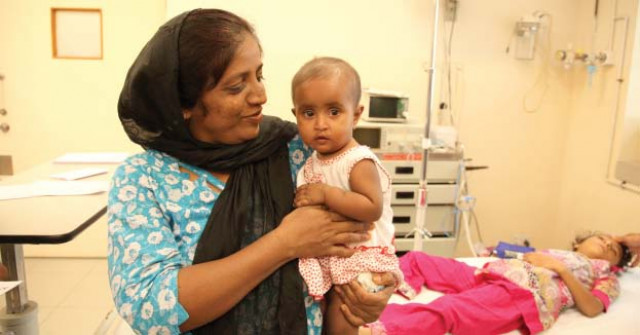Child-spacing project wraps up after giving birth to new public-private coordination
FALAH was launched in 16 districts across Pakistan.

They launched the Family Advancement for Life and Health (FALAH) project, with the support of USAID, aiming to create more understanding about the value of having children at planned intervals. Their focus was to help couples gain access to services and to remove barriers and misconceptions, said Dr Ali Mohammad Mir, the chief of party at FALAH. The project was launched in about 15 districts across the country and almost 16 more districts were added later.
Mir was speaking at a seminar organised on Thursday on the institutionalisation of the birth-spacing paradigm in Sindh, which called together health experts from the government, academics, the NGOs and the civil sector.
The seminar is the first of four such consultations to share the lessons learnt on sustaining work at the provincial level in the aftermath of the 18th amendment, explained Seemin Ashfaq, the senior programme manager at Population Council.
FALAH was launched in 2007 and its main objectives included acceptance and demand for birth spacing and contraception, the delivery of high-quality family planning services in the public sector, services through the private sector and an increase in the sales and distribution of contraceptives through social marketing and the commercial sector.
The projects soon garnered support from the government’s heath department and the population welfare department, said a representative of Population Council.
Javed Jabbar, a communications consultant for the project, explained how they worked. “We used three media to spread the message: mass, community and interpersonal,” he said. Evidence-based messages and a ‘tell the truth’ approach was used to deal with fears of side effects, objections from family members and religious objections. Health providers and ulema were involved for counselling.
The project primarily targeted married women of a reproductive age and their husbands, as well as public and private sector health providers and influencers such as mothers-in-law, religious leaders, community notables, policy makers etc. The campaign also aimed to promote a change in behaviour and responsibilities for husbands and males.
HANDS implemented the project in Sindh. Dr M Sarwat Mirza, the national coordinator of FALAH and the chief technical executive at HANDS, said that the project was carried out in six districts - Dadu, Ghotki, Larkana, Sanghar, Sukkur and Thatta, and later Jacobabad, Karachi (Gadap, Lyari, Orangi), Shikarpur were also included. The highlight of the Sindh campaign was the theatre, where community members were given a chance to sit together and talk about birth spacing. “We specifically told people that pregnancy below 18 years and after 35 years is extremely unhealthy for the woman and impacts the whole household,” he said.
Rehana Parveen, a community mobilisation officer at HANDS in Dadu, told The Express Tribune how the project was implemented. FALAH gave six days of training on behaviour changes and birth control methods to the health workers and officers from the health department and the provincial welfare department. “When we reached out to the community, the main change that we saw was that people listened to us and understood us,” she said.
Dr Masood Ahmed Solangi, the directorate-general of health in Hyderabad, said that the two participating government departments, the health department and population welfare department, have agreed to carry forward the programme by providing awareness at the health units. The population welfare department will pitch in by providing the contraceptives, treatment and workforce.
The USAID representative, Dr Nasreen Khan, said that maternal child health and family planning are priority thematic areas within the health sector and USAID will continue to support similar projects which are aimed at improving the health of people in Pakistan.
The project’s findings are likely to be made public by March this year.
Published in The Express Tribune, January 20th, 2012.



















COMMENTS
Comments are moderated and generally will be posted if they are on-topic and not abusive.
For more information, please see our Comments FAQ